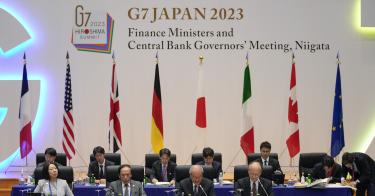As the global economy faces growing, complex challenges on multiple fronts, the Group of Seven leading industrialized nations needs to be reinvigorated to remain credible and relevant. South Korea is a fitting pivot for the much-needed regeneration of the G-7.
Recognizing that necessity, jointly advocating the expansion of the G-7 to the Group of Eight by inviting South Korea as a new member is in the interest of both Washington and Tokyo.
This year’s G-7 Summit, which will take place from May 19-21 in Japan’s Hiroshima, may well be the most critical since the establishment of the informal forum. If the G-7 cannot reconfigure itself with greater adaptability and capacity to navigate these complex challenges, it risks irrelevance.
The summit brings together the leaders of the United States, Great Britain, Canada, Japan, Germany, France, and Italy. The G-7 was founded in the 1970s in the midst of then-unprecedented oil price shock, gasoline shortages, stagflation, and the need for unity among the world’s largest industrial democracies when the then-Soviet Union appeared to be winning the Cold War.
The group now meets annually to discuss shared global security issues and economic matters. While there are no formal criteria for membership, member states are democracies and have highly developed economies.
Today, ensuring the unity and the relevance of G-7 is far more pressing, as the world’s free-market democracies are being confronted by Russia and China, both of which long ago voluntarily decoupled themselves from the values of free-market democracy that encompass the rule of law, openness, and respect for human rights.
From a broader foreign policy perspective, 2023 may be the most important year in global geopolitics since the end of the Cold War three decades ago. The G-7 only can meet the demands of this new era of conflict—in which Russia and China both pose grave and wide-ranging challenges—if the strength of the values-driven alliance can be reinforced and amplified.
To that end, South Korea, one of the world’s exemplary free-market democracies that knows how to make, build, and reconstruct, merits to be added to the G-7 as a new member. As South Korean President Yoon Suk Yeol unambiguously underscored in his recent address to a joint session of Congress during his state visit to Washington to commemorate the 70th anniversary of the alliance with the United States,
Our Alliance was forged 70 years ago to defend Korea’s freedom. The Alliance has now become a global alliance that safeguards freedom and peace around the world. Korea will fulfill its responsibilities. It will play its part that matches its economic capacity.
Indeed, South Korea’s membership in the G-7 is an extended, next logical frontier of further operationalizing the U.S.-South Korea alliance. All the G-7 member nations should welcome that, particularly to preserve and enlarge the free, open, and democratic spaces that can bridge Indo-Pacific and transatlantic communities.
In that context, it is also encouraging to see a positive new chapter in South Korea’s relationship with Japan, which is a critical dimension of adding South Korea to the G-7.
In his groundbreaking speech on March 1, which outlined a new horizon for an elevated partnership between two of America’s closest Indo-Pacific allies, Yoon embraced Japan as a “partner” in tackling global challenges and emphasized that the trilateral cooperation among the three nations “has become more important than ever.”
Reflecting the same sentiment, Japanese Prime Minister Fumio Kishida’s recent visit to South Korea (the first time in 12 years) was a very notable forward step toward charting “an important new chapter and a new beginning for [America’s] alliance partners.”
Yoon will visit Hiroshima to attend the G-7 Summit as a guest at Kishida’s invitation. Certainly, it is high time for Washington, Seoul, and Tokyo—the three key drivers of transpacific stability and peace—to work more closely and pragmatically together to elevate the trilateral relationship to the next level.
In his message outlining what a successful G-7 Hiroshima summit would look like, Kishida underscored,
There are mounting challenges facing the international community, such as the global economy including energy and food security, regional affairs including Ukraine and the Indo-Pacific, nuclear disarmament and non-proliferation, economic security, and global issues including climate change, global health, and development. As chair, I will facilitate candid discussions among the G-7 Leaders to articulate ideas and plans for the future.
For that matter, formally initiating dialogues on the expansion of the G-7 by inviting South Korea as a new member deserves timely and serious consideration by both Japan and the U.S. during the upcoming summit.
This piece originally appeared in The Daily Signal




